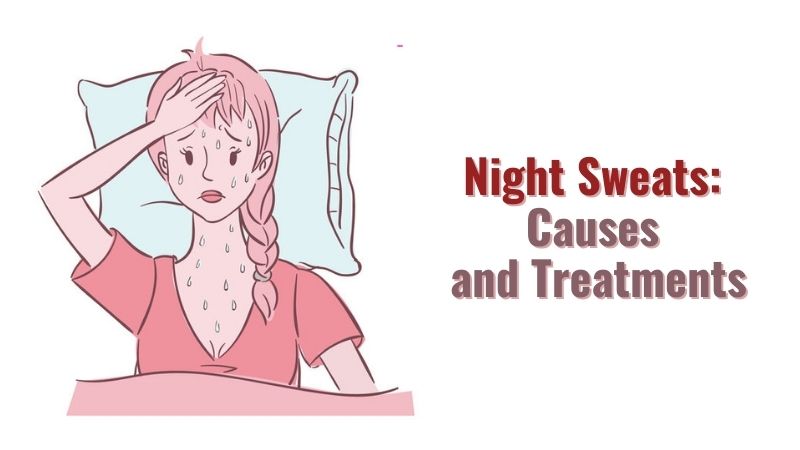
According to statistics, more than a third of patients complain of periodic night sweats that occur during the day. This condition is not always a sign of a disease, however, if such a symptom regularly occurs for no apparent reason, you should pay attention to this.
The causes of excessive night sweats are divided into non-medical (external) and medical (internal). Non-medical reasons include:
In addition to these fairly obvious factors, there are medical, more complex causes of excessive sweating at night:
In addition, nocturnal hyperhidrosis can be caused by the use of certain medications (including phenothiazides), overweight, age-related hormonal changes (puberty, menopause and PMS in women, andropause in men).
As you can see, there can be many reasons for increased night sweats in women and men. If you notice excessive sweating at night, which is associated with medical factors, be sure to consult a doctor for correct diagnosis and timely treatment of possible diseases in the early stages.
In addition to most of the reasons listed above (hepatitis, pneumonia, etc.), night sweats in children can signal a calciferol deficiency (vitamin D), in which the back of the head sweats during sleep, as well as congenital heart disease or Cerebral palsy.
Night cough and sweating in children give almost all infectious inflammatory diseases of the respiratory tract, accompanied by fever.
One of the possible options for children aged 4-12 years old is night sweats due to night fears.
If a child has a hepatic trimodes infection and opisthorchiasis, he or she has weakness and lethargy, poor appetite, night sweats, diarrhea and sore throat (or perspiration), abdominal pain on the right. You should bear in mind that night sweats can be caused by helminthiasis.
If a child has snoring and night sweats, then you should contact an otolaryngologist since only a specialist can find out the possible cause of these symptoms: tonsillitis, inflammation of the pharyngeal tonsil, a curvature of the nasal septum or obstructive sleep apnea syndrome.
An overactive thyroid gland also causes heavy sweating during sleep, and endocrinologists say Graves’ disease is often diagnosed in girls aged 11-15 years old. Children aged 6-14 years old may develop a rare tumor of the adrenal glands – pheochromocytoma, which manifests itself as nocturnal hyperhidrosis, episodic attacks of tachycardia and increased blood pressure.
Pediatricians warn that night sweats in adolescent children can be not only a physiological sign of puberty (teenage “hormonal storms”) but also a symptom of leukemia (acute lymphoblastic or myeloid leukemia) or Hodgkin’s lymphoma.
One of the most common causes of nocturnal hyperhidrosis in women over 43-45 years old is hormonal changes associated with menopause and perimenopause. Night sweats with menopause and daytime “hot flashes” are the classic vasomotor symptoms of this condition, which is caused by a decrease in the level of estradiol in the blood and a violation of the circadian rhythm of GnRH secretion.
Night sweats before menstruation is a physiologically normal phenomenon and is associated with the same sex hormones. But if a young woman suffers from night sweats and this is not associated with the menstrual cycle, then one should be wary of problems with the thyroid gland or pituitary gland, as well as premature extinction of ovarian function or the possible development of a hormone-dependent tumor.
Sweaty palms during pregnancy can be caused by changes in hormone levels, and night sweats after childbirth are also associated with the elimination of excess interstitial fluid accumulated during pregnancy.
Night sweats in men have many causes. But there are also specific reasons. After the age of 50, nighttime bouts of weakness and sweating may indicate the onset of andropause – an age-related decrease in testosterone levels, accompanied by an increase in blood pressure and disorders in the genitourinary sphere. This condition is physiologically conditioned, that is, it is not a pathology. However, you should bear in mind that night sweats in men under 40 can be a sign of dangerous diseases such as inflammatory prostate cancer or testicular cancer.
Night sweats after alcohol are caused by the fact that the blood vessels reflexively expand, the acidity of the blood increases, the production of insulin by the pancreas decreases, and the toxic load on the liver increases. By the way, increased sweating (as a result of low-grade fever) may be in the initial stage of liver cirrhosis.
To find out what is the reason for increased night sweating, you must first consult a general practitioner who will prescribe the initial tests and examinations:
If nocturnal hyperhidrosis is primary (if it is not associated with any pathology in the body), then its treatment will be local. It is prescribed depending on the degree of discomfort brought to the patient by increased night sweats. Modern methods of treating perspiration during sleep include:
If pathologies are detected, more in-depth examinations by specialized specialists will be prescribed since here we can talk about the so-called secondary nocturnal hyperhidrosis associated with any disease that provokes profuse sweating during sleep.
To treat excessive nighttime sweating, you can use alternative treatments:
When sweating, you can prepare a herbal sage decoction, which has astringent properties due to the content of thiamine, magnesium and rosmarinic acid. The broth is prepared at the rate of 10-15 g of fresh or dried sage leaves per glass of water. In addition, herbalists recommend making a decoction of astragalus (goat’s rue) or the roots of creeping wheatgrass and drinking it during the day between meals.
It is important that trousers and blouses are comfortable and free of movement. Give preference to leather shoes. Synthetic clothing and footwear made from artificial materials can increase perspiration.
Category: Hyperhidrosis
Tags: excessive sweating, night, night sweats, sweating, sweaty palms
© 2025 www.curesweatypalms.com. All rights reserved.